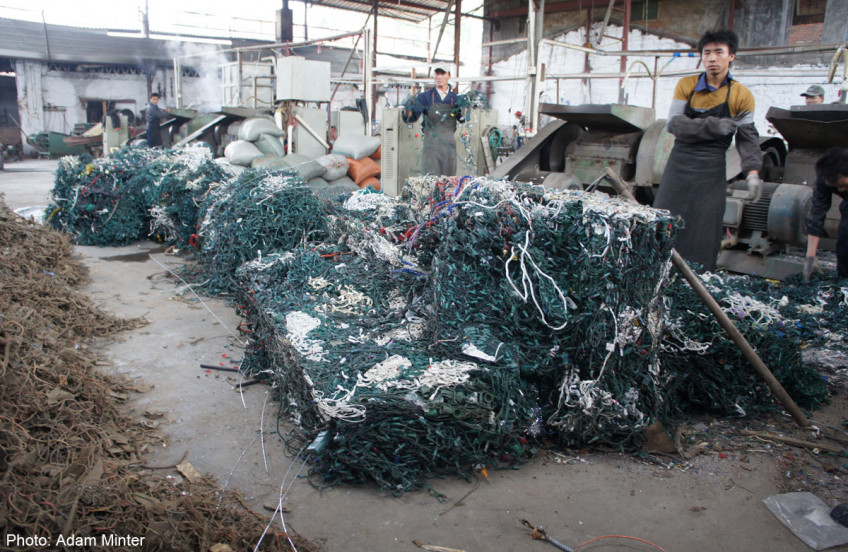A love for rubbish

"This is the one that really got me, and it was a bit upsetting as well...It really drove home how cheap the labour is, and how important design is for recycling. What an awful product the blister pack is; you can't really separate the foil from the plastic easily."
When writer Christine Tan first told her parents about her new journalist beau three years ago, their initial reaction was: "He writes about what?"
It turned out that said beau, Adam Minter, 43, a freelancer and Shanghai correspondent for Bloomberg World View, had spent the past 12 years writing about trash, among other things. And his first book, the newly released Junkyard Planet: Travels In The Billion-Dollar Trash Trade (below), is the culmination of that effort.
Minter did not start out just writing about rubbish.
The scion of a scrap-dealing dynasty, he grew up in Minneapolis amid the clatter and metallic tang of the family scrapyard, started by his great-grandfather at a time when "a burlap sack, a horse and a truck" was all one needed.
In a telephone interview from his wife's hometown in Kuala Lumpur, where they were celebrating Chinese New Year, he tells of how his grandmother and father would rise at dawn to buy and sell copper tubes, old cars, electrical wiring and even spent brass bullet casings.
While still in school, he was separating iron washers from brass pipes, and weighing cans reeking of beer and syrupy drinks.
"You can't get too proud if you're running the can machine," quips Minter, who will be in town next week to speak about his new book.
One early memory: watching his canny grandmother, the daughter of Russian Jewish immigrants, scour garage sales to buy a battered brass vase worth more in brass than it was being sold for.
None of the three Minter children went into the family business, and the family scrapyard was shuttered in 2005 when the city government bought its land. Minter turned to journalism instead, working for local Minnesota publications such as the now- defunct The Rake magazine. But in 2002, a freelance assignment sent him to Foshan in central Guangdong to write about recycling there.
It turned out to be a front-row seat to the transformation of China, one scrapped appliance at a time. Despite the country's bad reputation for pollution, as demand for raw materials surged, China's enterprising towns began recycling everything from American Christmas-tree lights to old cathode-ray-tube television sets - and got rich doing so. The global recycling industry is worth as much as US$500 billion, or S$634 billion, each year.
It is straightforward economics: Cheap labour means companies can afford to do labour-intensive recycling such as stripping the insulation from copper wires, using methods that mirror Minter's own scrapyard roots.
In a Mumbai market in 2006, Minter said, he found a shop where people were peeling foil off the blister packs that hold pills and tablets, to recycle the foil and plastic.
"This is the one that really got me, and it was a bit upsetting as well...It really drove home how cheap the labour is, and how important design is for recycling. What an awful product the blister pack is; you can't really separate the foil from the plastic easily," he said.
What is repurposed, too, can be surprising. In a Japanese plant at the base of Mount Fuji, Minter found old pachinko machines whose touch screens were shipped to China and turned into screens for car GPS units.
Even so, there are recycling problems that market forces alone cannot deal with. For instance, the most cost-effective method of recycling electronic scrap will also pollute the environment. So Chinese e-waste legislation requires manufacturers to pay a fee that subsidises the clean recycling of their devices.
And if products are not built to last longer, Junkyard Planet argues, increased consumption will eventually cause waste even with a higher volume of recycling.
Today, Minter is based in Shanghai and Minneapolis with Christine, 29, now his wife. The couple wed in 2012 and she calls herself, tongue-in-cheek, a "scrap wife", occasionally joining him on the road to conferences and scrapyard visits. They have no children.
And his in-laws, who once recoiled at the thought of such unsavoury but globally vital subject matter? "Now, they're quite enthusiastic about it," he says.
Junkyard Planet: Travels In The Billion-Dollar Trash Trade (Bloomsbury Press) is available at all major bookshops for $41.73 (including GST).
Adam Minter will speak about Junkyard Planet and the publishing process at Singapore Management University on Wednesday, 2 to 3.30pm. The talk will be held in the Li Ka Shing Library, Meeting Room 5. To RSVP and for more details, go to library.smu.edu.sg/events/2014/ 02/12/adam-minter-book-talk-12-february-201

Get a copy of The Straits Times or go to straitstimes.com for more stories.